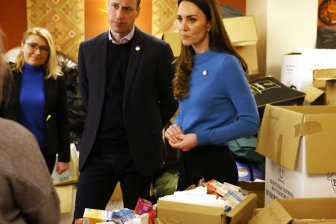Russia is targeting Ukraine’s food supply and infrastructure, minister warns – National | Globalnews.ca
Agriculture Minister Marie-Claude Bibeau has warned that Russian forces are targeting Ukrainians‘ food supply, including their stores of grain.
Bibeau, who attended an emergency meeting of G7 agriculture ministers on Friday, said Ukraine’s minister told them Russian forces are hitting grain silos, ports and the infrastructure needed to gather and distribute the harvest, as well as food storage facilities.
In an interview after the G7 meeting, Bibeau said Russia’s attempt to disrupt Ukraine’s food supply was “shocking” and a further sign that Russian targets are not just military as claimed by President Vladimir Putin.
Read more:
Russia-Ukraine conflict: Are we in the undertow of an inevitably wider war?
“What I was particularly alarmed about was the fact that Russia is really targeting agricultural infrastructure, silos, grain elevators, the port itself being a major part of it,” she said.
Bibeau said this was having a “direct impact on their capacity to produce food for their own population — to feed their population.”
She said Ukraine’s agriculture minister told the G7 meeting that the embattled nation’s farmers face severe challenges to harvest this year’s crops.
Not only are farmers and many farm workers fighting the Russians, but Ukraine’s military has also commandeered stores of fuel for farm machinery, such as combine harvesters.

“All the diesel that they had in storage for farms has been provided for military vehicles,” she said. “They are running out of diesel.”
She said Canada, a major donor through the World Food Program, was funnelling food aid to Ukraine.
“It is extremely challenging to say the least — critical — and we are trying to see as friends how we can help, how we can help through the World Food Program.”
But she warned that Canada and the U.S. had a weak harvest last year because of a drought, so stocks of grain were lower than usual.
Read more:
Why is Russia invading Ukraine? Amid ‘astounding’ resistance, here’s what you need to know
Bibeau added that this year, Canadian farmers could face shortages of fertilizer, which it usually buys from Russia.
She said this could affect this year’s harvest, although Canadian farmers were trying to find alternatives.
The minister cautioned that consumers should expect a spike in the cost of bread and pasta following a rise in wheat prices after Russia’s invasion. Vegetable oil, another big Ukrainian export, could also be in short supply.
Ukraine is one of the world’s largest exporters of wheat and sunflower oil, and many countries in the developing world, including Lebanon and Bangladesh, rely on its wheat for staple foods, including bread.

Shipping companies have also been refusing to carry Russian grain on principle since it invaded Ukraine and because their insurance premiums have gone up dramatically since the start of the war, said Arif Husain, chief economist at the World Food Program.
Julie Marshall, Canadian spokeswoman for the World Food Program, said world food prices are at an all-time high and the crisis in Ukraine is hitting “hunger hot spots” hard.
“The consequences of the Ukraine conflict are having a global impact, triggering a wave of collateral hunger that is spreading across the world,” she said.
“The Middle East and North Africa is particularly vulnerable to higher food prices because it imports large quantities of food. Lebanon imports more than 50 per cent of its wheat from Ukraine. For Yemen, the proportion is 22 per cent. In Tunisia, it is 42 per cent.”
Sophia Murphy, executive director of the Institute for Agriculture and Trade Policy, a non-profit organization promoting sustainable agriculture, said: “The dramatic rise in food, fertilizer and fuel prices worldwide triggered by the war is a stark reminder of how quickly food security outlooks can change.”
© 2022 The Canadian Press
For all the latest World News Click Here
For the latest news and updates, follow us on Google News.




